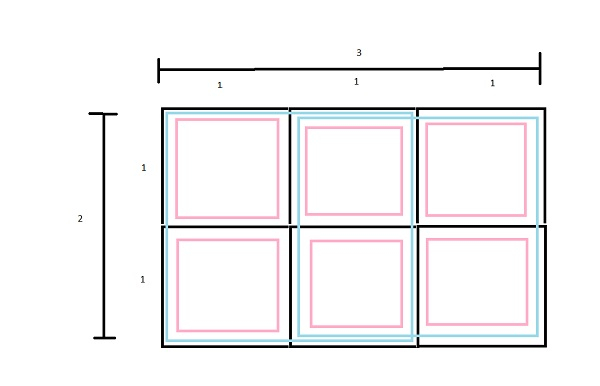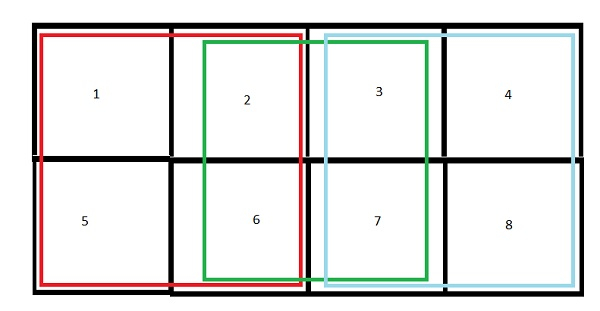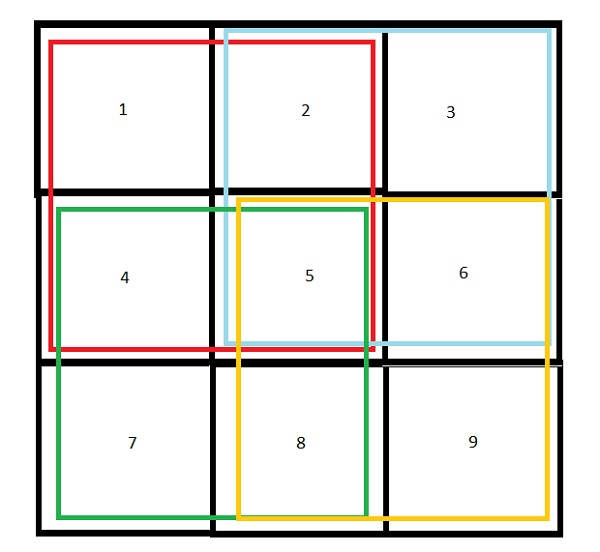
 Data Structure
Data Structure Networking
Networking RDBMS
RDBMS Operating System
Operating System Java
Java MS Excel
MS Excel iOS
iOS HTML
HTML CSS
CSS Android
Android Python
Python C Programming
C Programming C++
C++ C#
C# MongoDB
MongoDB MySQL
MySQL Javascript
Javascript PHP
PHP
- Selected Reading
- UPSC IAS Exams Notes
- Developer's Best Practices
- Questions and Answers
- Effective Resume Writing
- HR Interview Questions
- Computer Glossary
- Who is Who
Count number of squares in a rectangle in C++
We are given with a rectangle of length L and breadth B, such that L>=B. The goal is to find the number of squares that a rectangle of size LXB can accommodate.

Above figure shows a rectangle of size 3 X 2. It has 2, 2X2 squares and 6,1X1 squares in it.
Total squares= 6+2=8.
Every rectangle of size LXB has L*B number of 1X1 squares.
Biggest squares are of size BXB.
For L=B=1, squares = 1.
For L=B=2, squares = 1 + 4 = 5. ( 1 of 2X2, 4 of 1X1 )
For L=B=3, squares = 1 + 4 + 9 = 14. ( 1 of 3X3, 4 of 2X2, 9 of 1X1 )
For L=B=4, squares = 1 + 4 + 9 + 16 = 30 ( 1 of 4X4, 4 of 3X3, 9 of 2X2, 16 of 1X1 )
……………..
For every BXB rectangle number of squares is
for ( i=1 to B ) No. of squares + = i*i.
When L>B. More squares will be added. When L=B+1 ( 1 extra column than B ). Then squares added will be L + ( L-1) + ….+3+2+1 = L(L+1)/2
So for extra L-B columns squares added will be ( L-B ) * (B)(B+1)/2
Total squares will be squares in BXB + (L-B) * (L)(L+1)/2.
You can also use formula B(B+1)(2B+1)/6 for the series (1 + 4 + 9 +......BXB) in step 8.
Let’s understand with examples.
Input − L=4, B=2
Output − Count of squares in rectangle − 11
Explanation − 8 squares of 1X1 and 3 of 2X2.

Input − L=3, B=3
Output − Count of squares in rectangle − 14
Explanation − 9 squares of 1X1 , 4 of 2X2 and 1 of 3X3.

Approach used in the below program is as follows
We take an integers length and breadth for dimensions of rectangle.
Function numofSquares(int l, int b) takes dimensions and returns the number of squares in the rectangle of size lXb.
For biggest squares bXb. Use for loop from 1 to b and add each i*i to squares.
Now if l>b. New added squares will be (l-b)(b)(b+1)/2. Add this to squares.
Return squares as desired result.
Note − keeping length>=breadth
Example
#include<iostream>
using namespace std;
int numofSquares(int l, int b){
int squares=0;
for(int i=1;i<=b;i++) //squares inside biggest square of size breadth X breadth{
squares += i*i;
}
squares+=(l-b)*b*(b+1)/2;
return squares;
}
int main(){
int length = 5, breadth = 4; //keep length always >= breadth
cout << "Count of squares is :"<< numofSquares(length,breadth);
}
Output
If we run the above code it will generate the following output −
Count of squares is :40

